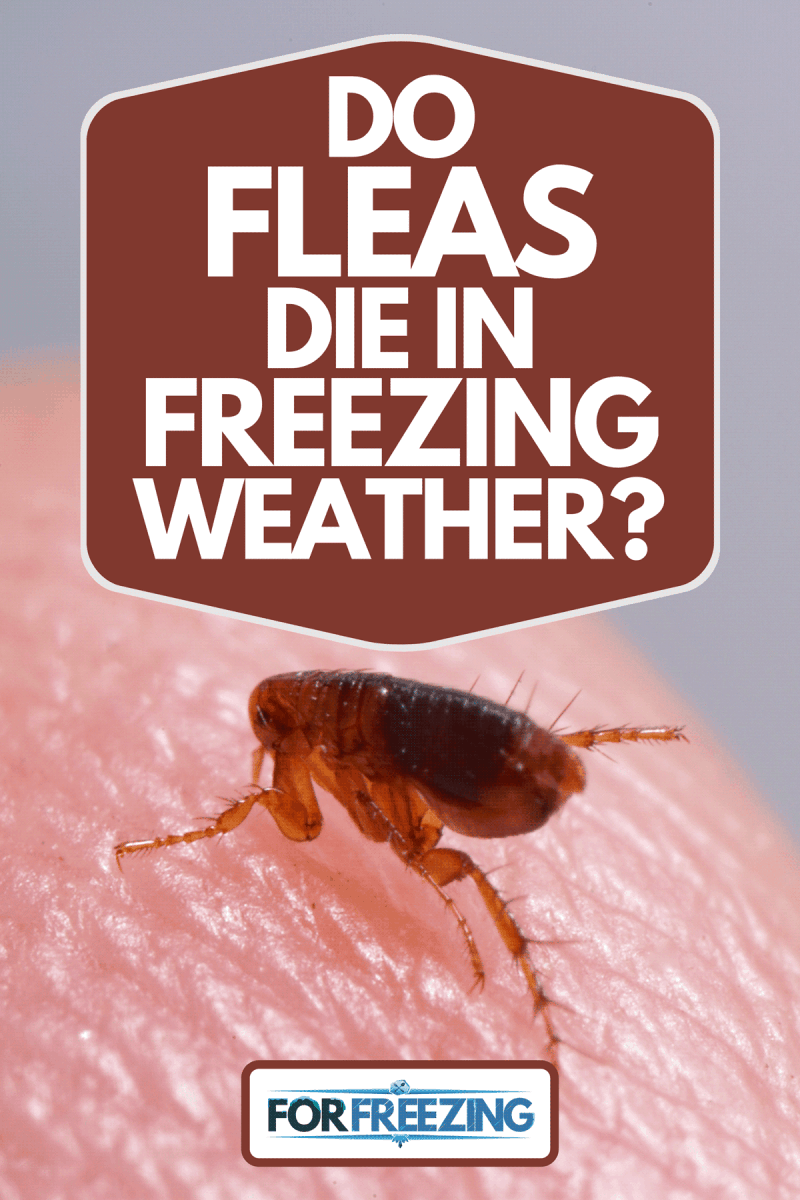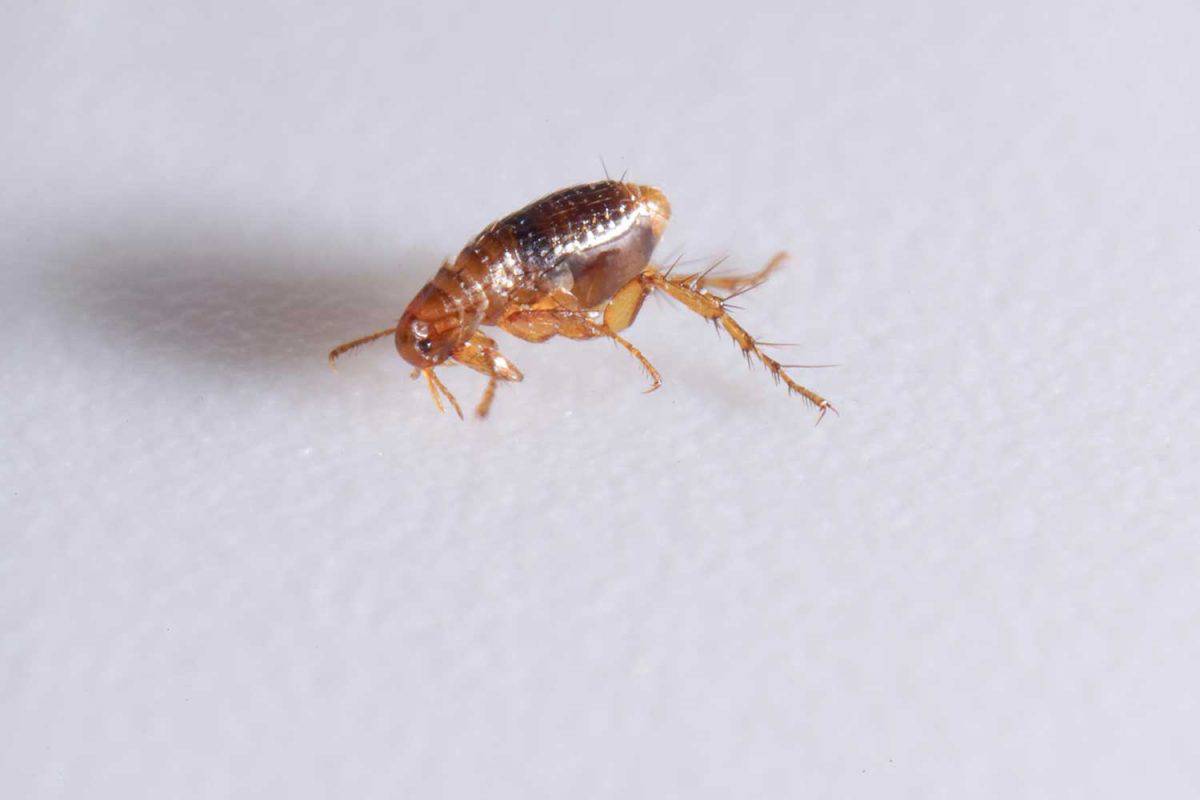Fleas are common pests that put the health of both pet and owner at risk. Now, you might wonder if they also die off in the freezing winter like other pests, or maybe you have an infestation, and you’re looking for ways to get rid of them. Either way, we’ve done the research to answer your question in case you need to keep your home and your pet flea-free.
In freezing temperatures, no flea at any stage of its life cycle can survive if its exposure is prolonged. It can take approximately 10 days in temperatures below 37o F before they die.
If you are trying to control a flea infestation, there are some more things you should understand about them. Keep on reading, and we’ll discuss how fleas react to adverse conditions and the stages of their life cycle. We will also provide you with some advice on dealing with flea infestations, as well as measures you can take to prevent them.
NOTE: WE MAY GET A COMMISSION IF YOU DECIDE TO MAKE A PURCHASE THROUGH THESE LINKS. THERE'S ADDITIONAL NO COST TO YOU. CHECK THE BOTTOM OF THE PAGE FOR MORE INFORMATION.

Fleas in Cold And Freezing Weather
Does cold weather get rid of fleas?
Unlike other pests, cold weather or wintertime does not make fleas go away. Instead, they hide in heated places or attach themselves to a host. However, unless the conditions are right, their development stops. Flea eggs, for example, go dormant until it gets warmer again and then hatch within 2-14 days.
Pupae exhibit similar behavior. Development can be delayed for weeks to months if it is too cold or there are no hosts around. PetMD says, at a temperature of 51.8oF, fleas can survive in their cocoons for up to approximately 120 days (30 weeks).
What temperature will kill fleas?
Temperatures above 103o F and a humidity of less than 75% eliminate both adult and developing fleas. Accordingly, temperatures below 37o F can kill fleas at any stage in their life cycle.
The Flea Life Cycle
Fleas are ectoparasites that favor mammals. The types commonly found in domestic animals are from the genus Ctenocephalides. Accordingly, all kinds under the genus have the same four-stage life cycle of egg to larva to pupa to adult. Typically they prefer warmer climates, at temperatures of 75o F to 85o F and in 70% humidity. In these conditions, they can go through a whole life cycle and reach maturity in 21-28 days.
Flea eggs are usually small, white, and oval. You can find them in bunches of about 20 eggs in your pet’s fur. Female fleas lay the eggs once they can consume blood from their host.
The eggs hatch into larvae, which are about ¼ on an inch long and pale. They have no eyes and only have a rudimentary mandible. At this stage, the larvae do not need a host to survive. Instead, they feed on flea dirt, a mixture of blood and feces excreted by the female flea after consuming blood and other organic material. Because they are blind, the larvae favor hiding in dark areas, away from sunlight.
The larval stage has three “instar” stages, which it goes through in 10 days if the conditions are right (77° F and 75% relative humidity). During the last stage, it spins a cocoon marking its transition to a pupa.
Inside the cocoon, larvae molt and develop into adult fleas in 4 days if the conditions are optimal. The pupae's outer layers allow it to stick to surfaces like carpets and protect them against chemicals, making them harder to eliminate. Once mature, the flea waits until it can detect vibrations, increases in carbon dioxide, or body heat which signal the presence of a warm-bodied host. When they do, they emerge from the cocoon and seek the host.
Adult fleas are dark-colored with flat bodies. As they grow and consume their host’s blood, their color lightens. At this point, they need a host so they can feed, mate, reproduce and grow. Without one they can still survive, but not for long.
When will fleas die off?
There is no exact time when adult fleas will naturally die off. It can be between 8 days to 90 days. However, their chances of living longer depend on whether or not they have a host. There is also no exact season except in a consistently freezing winter.
Getting Rid of Fleas

Now that we know how fleas develop and what environment they thrive in, we can focus on getting rid of them. Before that, here are a few things to remember:
- Fleas reproduce rapidly and continuously throughout the year. Therefore, as soon as you detect a flea problem, it’s best to deal with it right away to break their life cycle and stop them from reproducing further.
- Fleas hide anywhere. As your pet moves around in your home, the eggs can fall off their fur and hatch in the immediate environment. Therefore, you have to be thorough in cleaning your pet and the surroundings. You should identify places your pet frequently passes through and spends time to make sure they are cleaned properly.
- Getting rid of fleas takes time. There might be some eggs, pupae, or adult fleas that survive in the area even after your first cleaning. Therefore, you should continue cleaning and observing preventive practices to stop the problem from recurring.
- Prevention is key. By taking precautions year-round for your pet and their living areas, you can avoid large-scale flea infestations. We will elaborate on how in the next section.
How do you get rid of fleas completely?
Treat your Pets
The first step in controlling a flea infestation is treating your pet. Baths, flea combs, and regular trims for longer-haired dogs can help treat and prevent minor infestations. Monthly flea medication prescribed by your veterinarian can also help with prevention.
Accordingly, there are medications for pest control that your veterinarian can give. They are usually insect growth regulators or insect development inhibitors. They come in spot treatments, oral medication or food additives, and sprays.
Insect growth regulators stop the fleas from developing into adults and therefore reproducing. It mimics a hormone in their body that triggers the development from larva to pupa but stops the molt into the adult form. Insect development inhibitors prevent fleas from forming a protective layer of chitin around their bodies. This hinders their normal development. For best results, it is used together with an IGR.
If you have an active infestation, your veterinarian might recommend a treatment that kills adult fleas. Some home remedies are also available on the internet however, their effectiveness is still to be determined.
Clean Your Home and Your Yard
Sanitation is key to both prevention and treatment. Thoroughly clean the areas your pet frequents, including your yard and immediate outdoor surroundings. Vacuuming can also eliminate eggs and larvae, especially if you get into the hard-to-reach areas they might be hiding in. If you are trying to control an infestation, you should vacuum everyday.
Also, change beddings, linens, or covers, especially the ones your pet uses. You can wash them in warm water and soap. There are also chemical remedies that can help eliminate fleas in your furniture, but you should also ask your veterinarian first to determine if they are safe.
To lessen the chances of your pet catching fleas in your yard, keep the grass short, and regularly prune your plants. The cleaner your yard is, the less appealing it is for fleas. Not overwatering also keeps the soil dry enough to minimize the humidity and moisture fleas enjoy.
Lastly, if you find that your remedies aren’t effective or that the infestation is getting worse, then calling for professional pest control might be the safest option.
Final Thoughts
Now that we’ve given you all the facts, you can take the steps you need to get rid of your pet’s fleas and stop them from coming back. Freezing weather does kill them, but it is not necessarily a solution. Therefore, even during the winter, you should always practice the flea preventive measures your vet recommends. Accordingly, if you already have an infestation, treat your pet and the areas they frequent, and if that doesn’t work, call a professional.
If this article helped you and you have more freezing-related questions, you can check out articles like Can You Freeze Apple Butter? or Can You Freeze Alcohol Into Ice Cubes? and more at ForFreezing.com.



